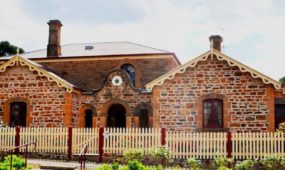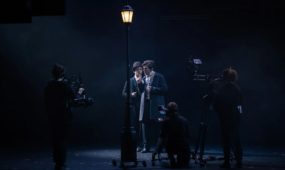The Book is dead. Long live the Book
Arts
Michael Bollen knows books. And 25 years of running Wakefield Press has taught him that when it comes to selling them, excitement and the word of mouth that follows is still king.

Sign up to receive notifications about new stories in this category.
Thank you for subscribing to story notifications.
He knows that every year at the Frankfurt book fair, the same Holden book by Don Loffler will be stolen off his stand.
“I don’t know why – I suppose it must be pretty hard to get over there, but I always think there must be some car nut going through and finding that book, ” Michael Bollen laughs.
Though he’d rather people buy his titles, Bollen knows the excitement that drives a distant rev-head to pinch Holden Days is the same excitement that has readers forcing the book on their friends.
And it shows – “we’ve published five of Loffler’s Holden books and they all sell like nobody’s business.”
Bollen has also put paid to those who declare the book dead and gone.
“People love to think of the book as a stodgy bit of the 19th century – in a way it is. But it’s pretty adaptable and it keeps changing.”
As the book has changed so has Wakefield. It’s a challenge and necessity to keep up with the market, but despite countless doomsday predictions, there’s never been a shortage of readers – quite the opposite.
“I think more people are reading than ever, despite what the gloom-sayers love to say. When I was a kid we would talk constantly on the telephone. Now communication is mostly written: email, Kik, whatever language, whatever dialect.
“I took over in late ’88 – so it’s 25 years, actually,” Bollen says. “From the time when I started, I guess the fax was new. Well it wasn’t old – now you just think crikey. People paid in cheques!”
There has been a Wakefield Press in Adelaide, South Australia since the 1940s. The name has changed hands a few times, now residing with publisher Bollen.
“A fella called Harry Muir had a bookshop that’s still remembered by some veterans in Pulteney Street called Beck’s Bookshop,” Michael says of origins of the business he’s guided for the past 25 years.
Muir was a celebrated local collector and bookseller who started Wakefield Press with the intention to publish a few small, historical monographs that he thought wouldn’t get much of a look in otherwise.
His first book was A Checklist of Ex-Libris Literature Published in Australia in 1942.
“He published the occasional book in the 50s and 60s. The name more or less went in to abeyance until the early 80s when the SA government was helping to publish books commemorating South Australia’s 150th birthday since the founding of the British Colony,” Michael says.
A sunset clause on the project meant they had to move on.
Eventually the name, a secondhand computer and the right to distribute the books went to the Adelaide Review magazine which was in its infancy in those days.
That’s where Michael started working in 1987 by harassing the deputy editor, a friend he’d worked with in the government. Michael sold books, flogged ads and wrote reviews until the Adelaide Review decided it didn’t want to be a publisher.
They’ve grown since then but remain a small, independent book publisher well known for production values as well as some titles Michael calls “lively”.
From the small beginnings (and abstract connections) with Muir, Wakefield Press now publishes around 50 books a year across a range of topics as broad as art, history, culinary culture, food, fiction, poetry.
Most notably, they’re one of the few publishing houses to still do almost every part of production in house, whether that’s editing, design, typesetting, layout and – interestingly – distribution.
They even have a bookshop connected to their offices.
“It’s a terrific mixture between the business and the creative side. I think when you start contracting out you lose a bit of control – then again you need to have enough work and income to pay wages every week,” Michael says. “That’s always been a bit of a philosophy, whether we’re right or wrong. But we’ve hung in there for 25 years I suppose.”
Wakefield Press has found success in diversity and quality. They publish e-books, they’re involved in commercial publishing, they work international trade fairs and sell books and international rights just about anywhere they can.
But at the core of it, Michael says, it’s still about a good book properly presented to the public and talked about and told about.
“A good book is that one you want to get home to – that makes you look forward to going to bed, that is giving consolation or intrigue, making you smile or cry, or learning what you need and what thrills you,” he says.
Michael says what makes a good book commercially is when that book is affecting enough people to have people talking about it and buying it. “It doesn’t have to be a bestseller to do that,” he insists.
A large part of Wakefield Press’ challenge is putting that good book in front of the right person at the right time.
“On the bus they’re reading physical books. The challenge is working out how that market is being divided and cannibalised. Who wants what – and when.”
Since the big chains like Borders and Angus & Robertson have pulled out of Australia, Wakefield has had to chase up relationships with smaller booksellers.
“There are fewer, but the book shops are fantastic to us. Markets, fairs, wherever we can sell books we do. We have a big sale at the Norwood town hall just here. We sell quite a lot,” Michael explains.
A strong point of Wakefield is their firm base in South Australian history and topics. It’s a direct tie to the community and a fairly predictable stream of income for the business.
One of their latest local books is the wonderfully researched, designed and printed Almost an Island: The Story of Robe by Liz Harfull, which celebrates the small coastal community in South Australia.
“You’ve got a market to develop and you know where you are. People are hungry for this information. We are a city of a million odd,” he says. “As a commercial publisher you can’t rely on just the South Australian market for most books. You can estimate your costs, your likely sales and who is interested though.”
Wakefield’s books reach across countries and languages too – sometimes to odd places. Books are traveling, Michael says, and the cultural distance between Australian and the US or Europe or Asia is shrinking too.
“There’s a German translation of our vegan dessert book – so apparently that’s a craze everywhere,” he says with a smile.
Events like the Adelaide Festival’s Writer’s Week in March each year draw the international crowd to Wakefield, an opportunity that Michael relishes.
“There’s a publisher in San Francisco called Chronicle Books. They’re really well known for their high production values and design books,” says Michael. “She (the publisher) said she felt like she was home at Chronicle Books when she was looking at our design and the attitude during Writer’s Week. It’s great.”
It’s clear to see that Michael is proud – and the walls behind him are adorned with various design awards. Their art, design and photography books are particularly impressive.
City Streets by Mick Bradley is one example.
Wakefield put the fine art photographer on the streets of Adelaide to recount the steps of Gustav Baring, who documented all the major buildings and streets of the city in 1936 – and it’s a beautifully put together juxtaposition.
E-books are a more recent focus of Wakefield, and it can be a challenge to identify the best fit for that market.
“A lot of what we do in art and design books doesn’t translate to e-books. The big uptake so far in electronic books from the readers is cheap genre fiction,” Michael says.
Knowing what will sell in what format is hard.
“It’s a lot to catch up with, to make sure you’re keeping on top of the game since it’s a whole different structure with e-books on the market,” he says. “I don’t think it’s ever going to be like the music industry where things are utterly changed.”
He says people forget that publishers work in a high tech industry. Everything they do is electronic, no matter if it comes out as an e-book or a printed book.
A great thing about e-books, Michael finds, is that older volumes can have a new life as an electronic product, long after the bookshops have taken them off the shelf.
“The first best seller I ever published was back in 1991. It’s probably still our best e-book seller ever too. That’s 23 years later,” he says of the compilation of letters written by an Australian nurse, Lydia Laube, working in Saudi Arabia. “Behind the Veil had a real voice, and this was at the outbreak of the first gulf war. The book was immediately, hotly topical.”
Being topical is important but word of mouth reigns supreme in selling books he says.
“Back then it was print and TV that mattered,” Michael says, describing influencers. “Now it’s more fractured and all over the place, which is probably a good thing.”
“When you’re forcing books on people because you love them or think it’s going to change someone’s life, somehow it’s that snowball that starts and keeps rolling. Often you don’t really know why.
“The great and interesting thing is, is it hitting that particular nerve over time?”
Wakefield Press is expanding over time; their place in Australia is well and truly cemented, their e-book library is ever growing and there are top-secret plans to expand their commissioned work for businesses and clubs.
“There’s plenty of laws in publishing. One of the best is ‘nobody ever went broke by not publishing a book.’”
There’s no doubt that Wakefield exists in a difficult time for the industry. But there’s also no doubt that there are more opportunities opening up for publishers and authors too.
“It’s a case of being aware and taking the opportunities, trying to be clever,” Michael says. “People have been proclaiming the death of the book for 20 something years – longer probably. I get the sense, when a bookshop closes, the papers love to talk about a crisis. You get a quote from the liquidator who says, ‘oh, no one is reading books anymore.’ You kind of get the feeling you know the fella – he’s probably a nice guy, except he’s your buddy at school who was forced to read a book. You know, just hated the experience. So he’s really happy those guys who enjoy reading books are gone. That’s the sense I get anyway.”
Michael is the one at school who really enjoyed reading. His passion is obvious and infectious.
“There’s heaps happening,” he says. “I think we need to mine more of what young people are doing. There’s so much going on: poetry groups everywhere, slams, art.
“I love the idea of taking books to places, so people are inspired to create and to know it’s possible – a writer or illustrator or editor or photographer. That these things can result in something which — even if it doesn’t pay for your retirement — has value.”
All these opportunities keep him optimistic that good books will continue to be created.
“I don’t think publishers have outlived their usefulness at all.”
Published in Aspire magazine, June/July 2014
Jump to next article



